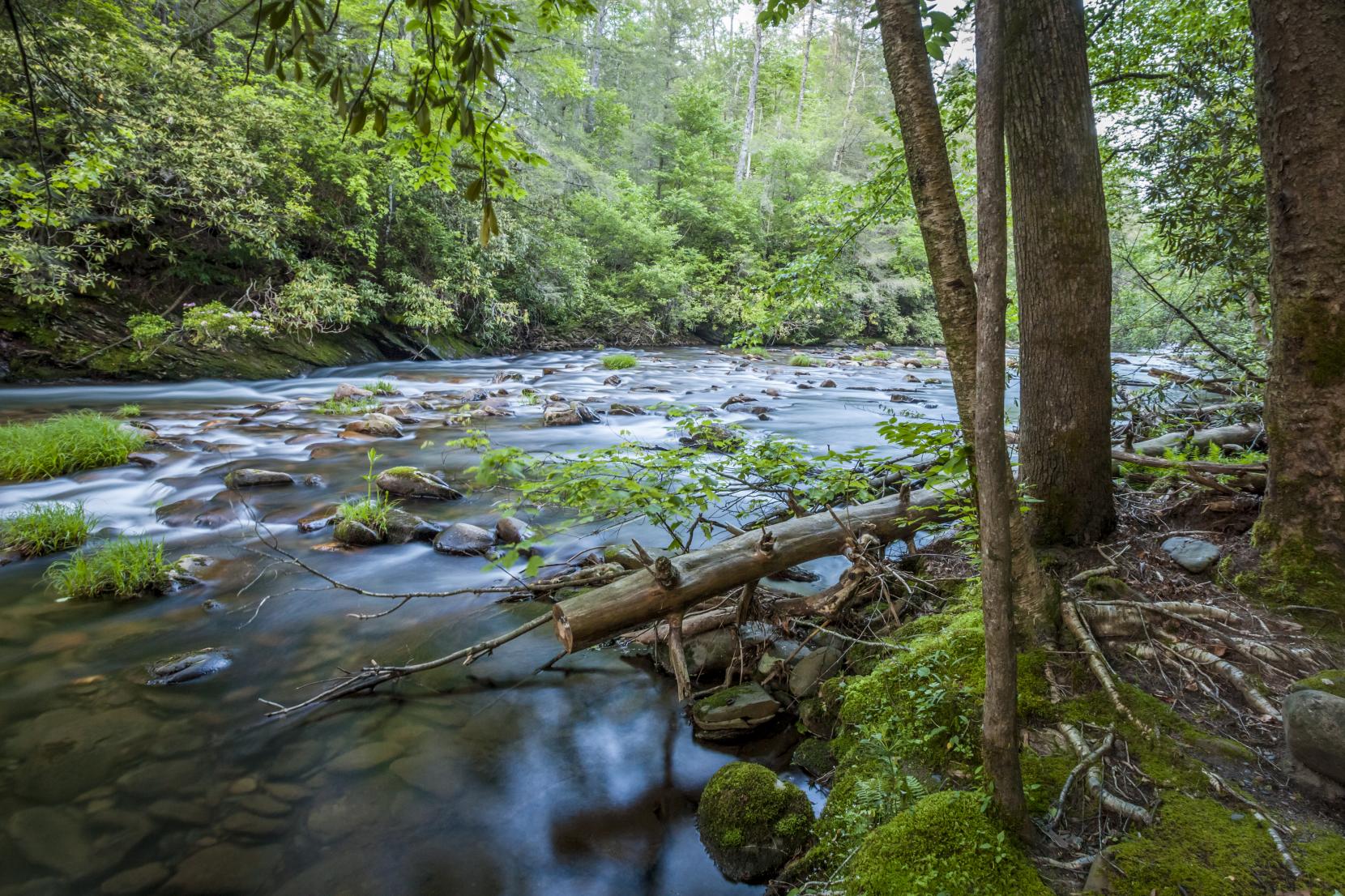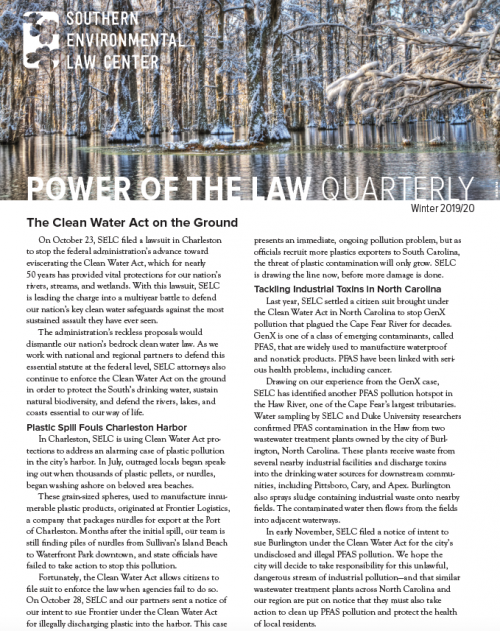Winter news, 2019
Browse the latest SELC news, compiled for our Winter 2019 print newsletter, below.
The Clean Water Act on the ground
On October 23, SELC filed a lawsuit in Charleston to stop the federal administration’s advance toward eviscerating the Clean Water Act, which for nearly 50 years has provided vital protections for our nation’s rivers, streams, and wetlands. With this lawsuit, SELC is leading the charge into a multiyear battle to defend our nation’s key clean water safeguards against the most sustained assault they have ever seen.
The administration’s reckless proposals would dismantle our nation’s bedrock clean water law. As we work with national and regional partners to defend this essential statute at the federal level, SELC attorneys also continue to enforce the Clean Water Act on the ground in order to protect the South’s drinking water, sustain natural biodiversity, and defend the rivers, lakes, and coasts essential to our way of life.
Plastic spill fouls Charleston Harbor
In Charleston, SELC is using Clean Water Act protections to address an alarming case of plastic pollution in the city’s harbor. In July, outraged locals began speaking out when thousands of plastic pellets, or nurdles, began washing ashore on beloved area beaches.
. 
These grain-sized spheres, used to manufacture innumerable plastic products, originated at Frontier Logistics, a company that packages nurdles for export at the Port of Charleston. Months after the initial spill, our team is still finding piles of nurdles from Sullivan’s Island Beach to Waterfront Park downtown, and state officials have failed to take action to stop this pollution.
Fortunately, the Clean Water Act allows citizens to file suit to enforce the law when agencies fail to do so. On October 28, SELC and our partners sent a notice of our intent to sue Frontier under the Clean Water Act for illegally discharging plastic into the harbor. This case presents an immediate, ongoing pollution problem, but as officials recruit more plastics exporters to South Carolina, the threat of plastic contamination will only grow. SELC is drawing the line now, before more damage is done.
Tackling industrial toxins in North Carolina
Last year, SELC settled a citizen suit brought under the Clean Water Act in North Carolina to stop GenX pollution that plagued the Cape Fear River for decades. GenX is one of a class of emerging contaminants, called PFAS, that are widely used to manufacture waterproof and nonstick products. PFAS have been linked with serious health problems, including cancer.
Drawing on our experience from the GenX case, SELC has identified another PFAS pollution hotspot in the Haw River, one of the Cape Fear’s largest tributaries. Water sampling by SELC and Duke University researchers confirmed PFAS contamination in the Haw from two wastewater treatment plants owned by the city of Burlington, North Carolina. These plants receive waste from several nearby industrial facilities and discharge toxins into the drinking water sources for downstream communities, including Pittsboro, Cary, and Apex. Burlington also sprays sludge containing industrial waste onto nearby fields. The contaminated water then fl ows from the fields into adjacent waterways.
In early November, SELC filed a notice of intent to sue Burlington under the Clean Water Act for the city’s undisclosed and illegal PFAS pollution. We hope the city will decide to take responsibility for this unlawful, dangerous stream of industrial pollution—and that similar wastewater treatment plants across North Carolina and our region are put on notice that they must also take action to clean up PFAS pollution and protect the health of local residents.
A stream in Georgia's Chattahoochee National Forest.
Georgia backcountry areas threatened by logging project
SELC filed a federal lawsuit in April to stop a U.S. Forest Service logging project that threatens backcountry areas in north Georgia’s Chattahoochee National Forest. As originally proposed, the Cooper Creek timber sale was more than double the size of the average logging proposal in the Southern Appalachian Mountains. For years, SELC highlighted the destructive, unlawful aspects of the project, and we convinced the Forest Service to drop 1,000 acres from the initial project’s scope. However, the revised proposal would still allow road building and nearly 300 acres of commercial logging in areas designated as unsuitable for timber production, including parts of the Duncan Ridge and Board Camp roadless areas.

Click to to view a PDF version of SELC's winter newsletter.
Fifteen years ago, thanks to the work of SELC and our partners, these areas were set aside from timber production because of their remarkable backcountry values. The popular Duncan Ridge Trail traverses these areas, winds through oak and white pine forests that are over 100 years old, and connects with both the Appalachian and Benton MacKaye Trails.
Now, under increased pressure to meet timber quotas, the Forest Service is walking away from its commitment to protect what makes these places unique. Our lawsuit aims to hold the Forest Service accountable and to preserve the possibility that these areas could receive even stronger protections in the future.
Additional newsletter headlines:
- Coal company wants to mine protected lands on Cumberland Plateau
- Union Hill's day in court
- North Carolina advancing toward quick action on strong climate change plan
- Utility debacle creates new solar opportunity in South Carolina
- Vogtle challenge gets a second chance
- Protecting Nashville's tree canopy
- SELC goes Above & Beyond to protect our health & environment
